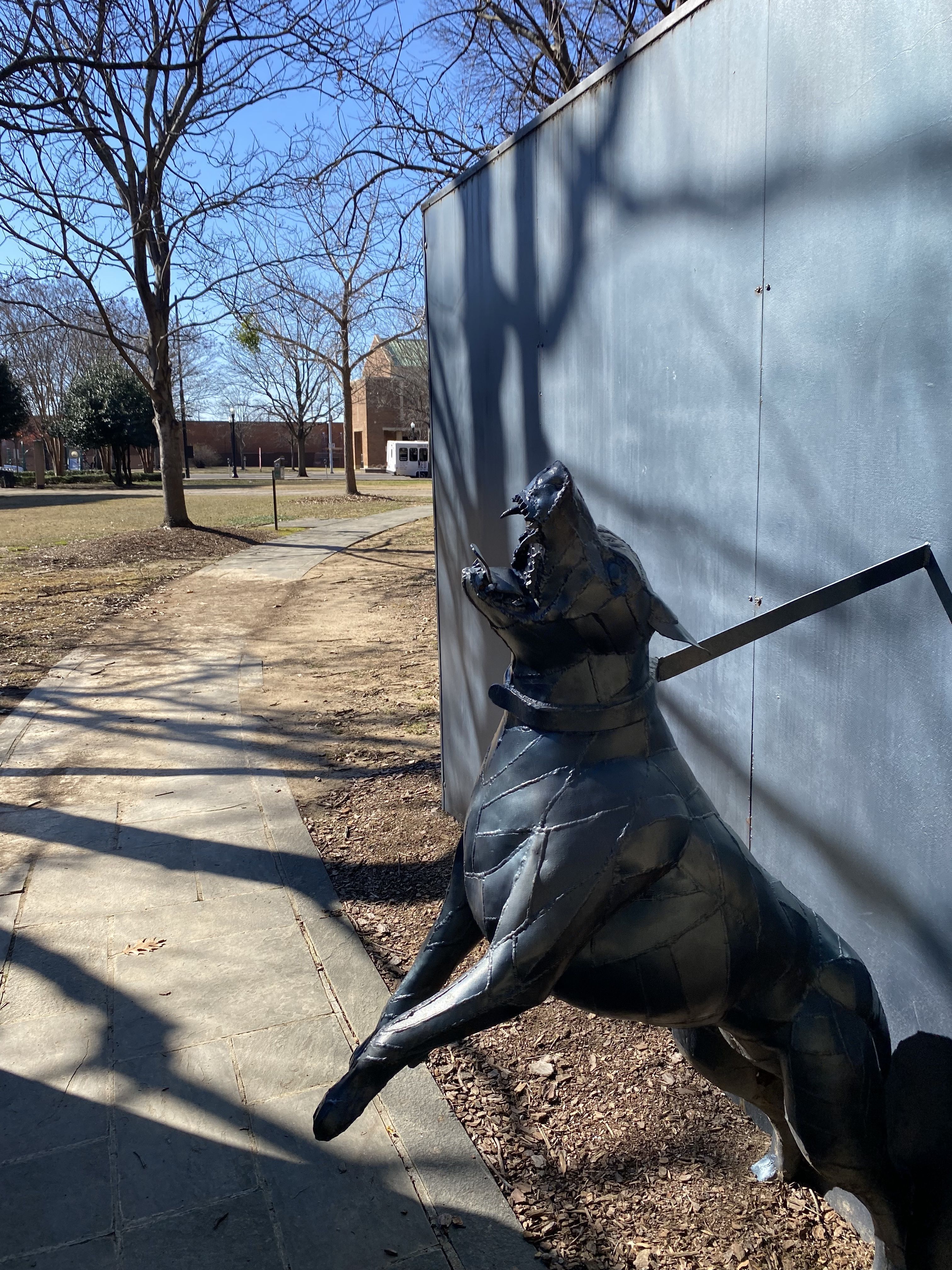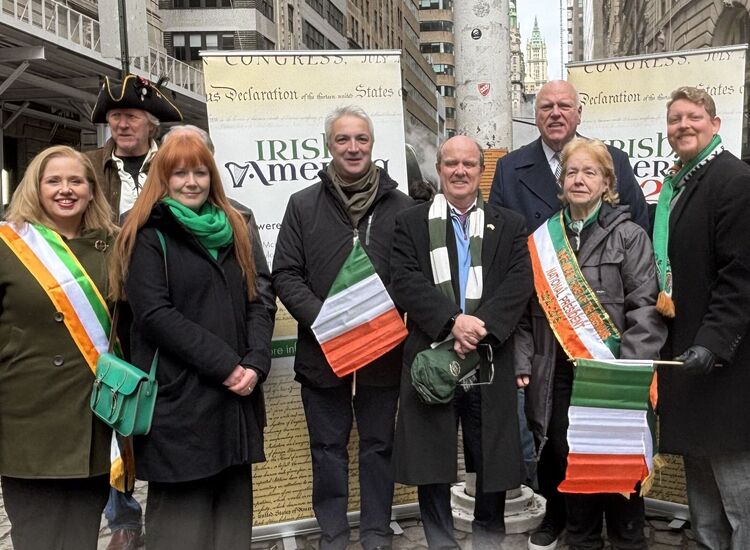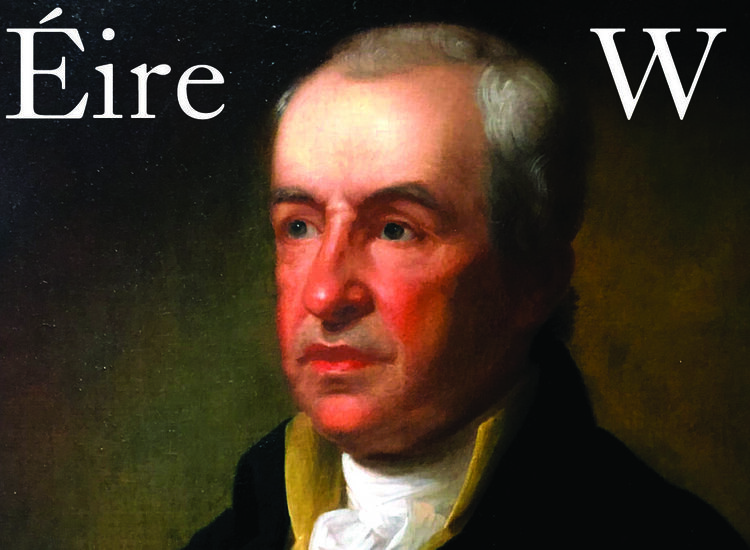As a white man entering a black church in America, it's hard not to cast the shadow of Dylann Roof, the crazed racist who joined a Bible Study class in a famed African American church in Charleston, South Carolina, in 2015 and proceeded to shoot dead all nine of his 'fellow-worshippers'.
And in Birmingham, Alabama, of course, those suspicious minds might be even more acute given that blowing up black churches has a long and sorry history here, earning the city the sobriquet 'Bombingham'. Those murderous, white supremacist attacks would culminate in the September 1963 blast at 16th Street Baptist which left four children dead, propelled the black civil rights battle on to front pages worldwide and forced the US President to introduce a long-delayed civil rights act.
And yet on Sunday 23 January, here at the Movement Fellowship Church on the outskirts of Birmingham, I am given the full Prodigal Son works by beaming parishioners filing in for Sunday service. For while face masks hide the smiles, I sense a joy and generosity here reflecting the comfort and sanctuary which the African American community has traditionally associated with the Lord's house.
I am here to attend worship with an old buddy of mine via Rev Jesse Jackson, Pastor Kris Erskine who serves a working class, black congregation who have known – and know — their share of sorrows. He has been forewarned that I am the world's worst Christian but is rolling out the red carpet nevertheless. "We share commonality," he writes me, "I strive and fall short on a daily basis."
FORWARD MOVEMENT: Sam Duncan, Pastor Jonathan Hatton, Mrs Donno Erskine and Pastor Kris Erskine outside their Birmingham church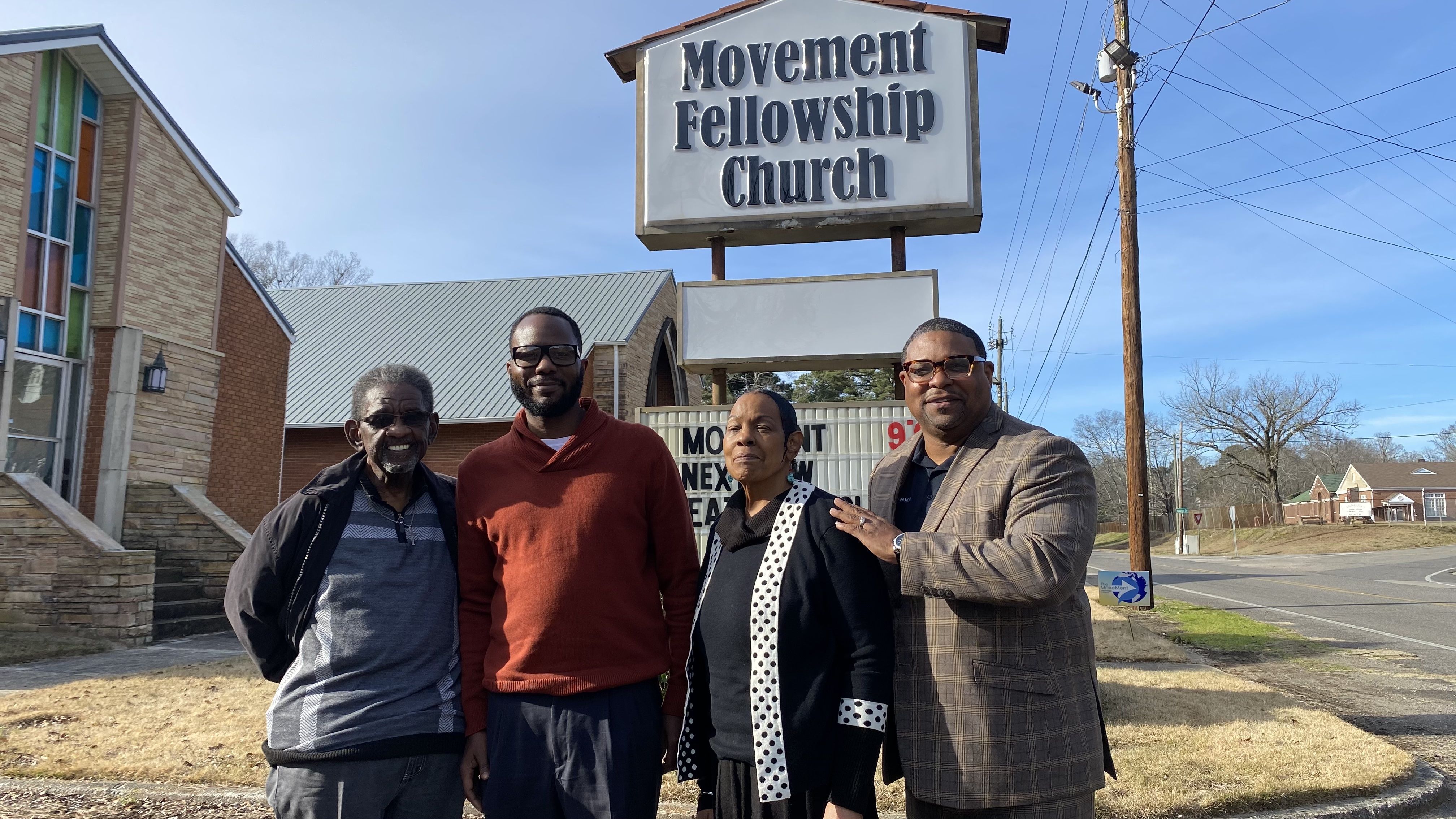
Truth be told, while not a person of faith, I have never failed but to be uplifted at a religious service and, equally importantly, I know it makes my 93-year-old mother proud to hear I have been to church — even 4,000 miles from home.
It is a long way from Sunday mass at St Teresa's in Andersonstown in the seventies: for starters we didn't have gospel singers like the Barnes family on stage, and certainly not with yellow stilettos! And then there is the high-octane, impassioned, sweat-soaked, soaring, and ultimately redemptive sermon of Pastor Kris — against a rising sea of Amens and full-bellied cheers from the faithful. This is sermon as adrenaline shot to the soul. "I am challenging you to praise God," Pastor Kris exhorts the faithful. "Some of them died for you to sit in a church today. Some of them died so you could sit in this church and have the comfort of not worrying about a bomb going off at Sunday school taking the lives of four little girls."
After addressing the gathering — with considerably less fire than Pastor Kris — I nipped out early to attend my second Sunday service (at this point my sainted ma is punching the air) on the hallowed ground of 16th Street Baptist Church where the Rev Arthur Price had invited me as a special guest alongside local Belfast ambassadors Mark and Allison Jackson. I bring with me greetings from the Free Derry Museum in recognition of the Bloody Sundays which unite two civil rights struggles - theirs on the bridge in Selma, ours on the streets of the Bogside. After service and another mesmerising sermon for the ages, the Rev Price invited us to the basement — where the four young lives had been lost — to view an evocative video of those times. Included was the heartbreaking eulogy of Martin Luther King for the victims in which he reinforced his message of non-violence but beseeched America to end the African American nightmare. Although standing in front of coffins of innocents, Rev King has not yet lost hope in the promise of America. "Their death says to us that we must work passionately and unrelentingly for the realization of the American dream," he tells the grieving community.
It wasn't difficult for this pilgrim to appreciate how comforting that pulpit message must have been at the height of the civil rights rising in the "most segregated city in America." There are, of course, comparisons to be made between the civil rights struggles made famous by backlash in Birmingham and Burntollet. But in its scale and severity, not to mention its roots in slavery and its shameful enshrining in law, the sweltering oppression of the Deep South forever trumps our own hell.
That much is clear from the searing memoir 'While the World Watched' by "wounded healer" Carolyn Maull McKinstry who came along to Bethel Baptist church, a sixties bridgehead for freedom of the Rev Fred Shuttlesworth, on the Monday to share her own peacemaking story with this Irish traveller. At the age of 15, Carolyn lost her four closest friends in the September 1963 bombing - just moments after she had chatted with them in that church basement. The following day, she was sent to school as normal and told not to mention the carnage she had witnessed. And she didn't — not for 20 years.
In her vivid recounting, the petty humiliations of this American apartheid are writ-large. She recalls being unable to use the public library or eat in a department store café in her native city because of the colour of her skin. "We serve no Negroes, Mexicans or dogs," declared the window signs in the Land of the Free. And these were no ad-hoc affronts from uneducated know-nothings but actual city ordinances - enforced to the nth degree by the establishment. "It shall be unlawful for any person in charge or control of any room, hall, theatre, picture house, auditorium, yard, court, ballpark, public park or other indoor or outdoor place, to which both white persons and negroes are admitted, to cause..any entertainment of any kind whatsoever unless such place has entrances, exits and seating set aside for the use of white persons, and other entrances, exits and seating set aside for negroes," reads the 1951 Birmingham Racial Segregation Codes.
SANCTUARY: The Rev Thomas Wilder outside the oft-bombed old Bethel Baptist church from which civil rights marches were launched by the Rev Fred Shuttlesworth.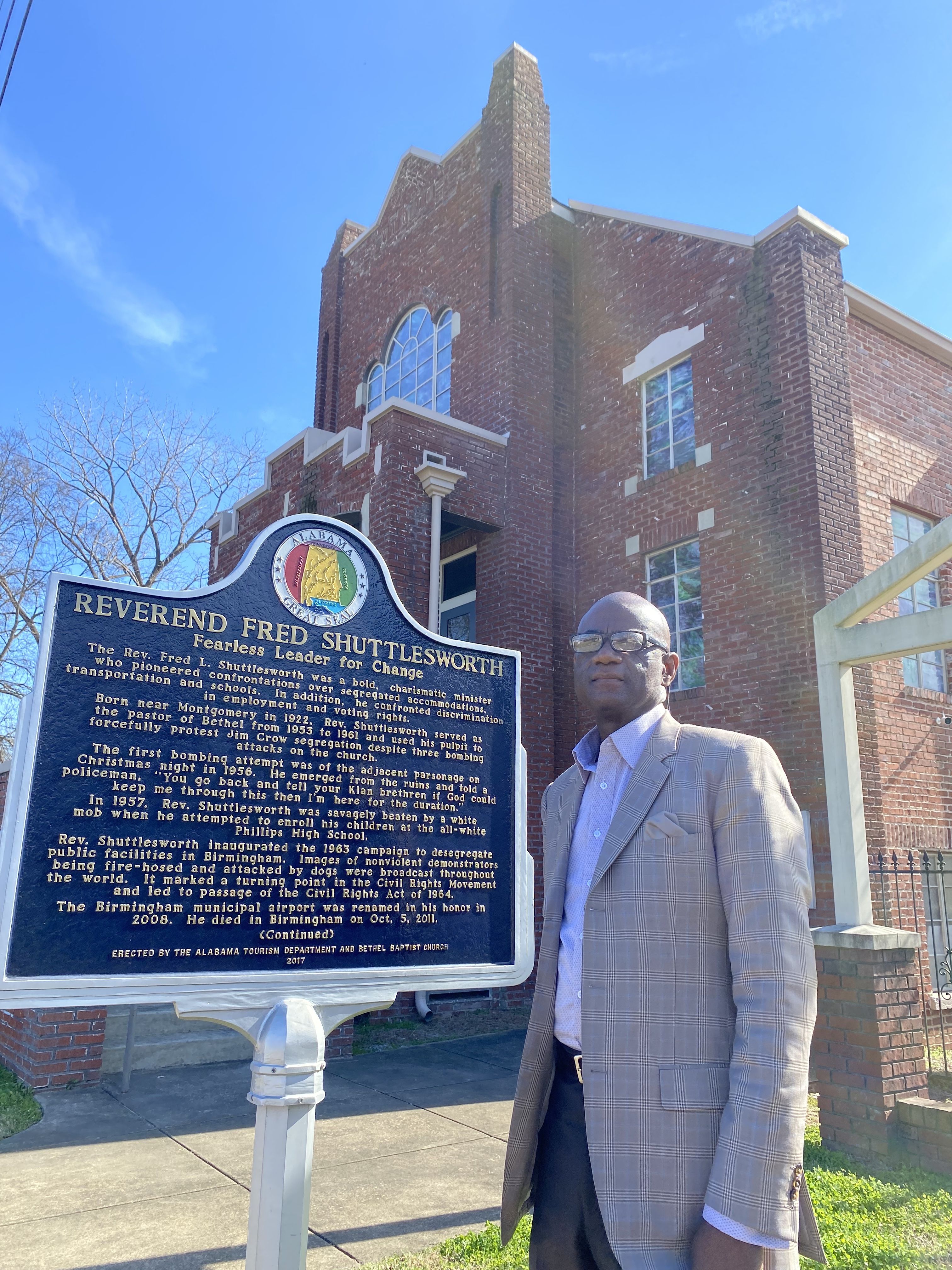
When the black community refused any longer to sit at the back of the bus and took to the diner counters to demand service and to the streets to demand equality, their homes were bombed, their leaders murdered and their young jailed. 2,000 children were doused with fire hoses, terrorized by dogs and locked up in fairground hog pens for taking part in the strictly peaceful Birmingham protests of May 1963 against segregation. Ironically, for the crusading children this was their first time in the fairgrounds as their colour barred them from attending the annual summer fair.
Carolyn recalls the day that the children, under the tutelage of the Rev Martin Luther King and civil rights warrior the Rev Fred Shuttlesworth, joined the freedom struggle leaving 16th Street Baptist in a line two-abreast to march to City Hall — to be met by the full force of ardent segregationist and Commissioner of Public Safety, Eugene 'Bull' Connor. "Four firefighters turned their hose on me. Our bodies jerked around, and we were pressed tightly against the building," she writes. "The water struck me like a stinging whip, and I was sure it would knock me down. I flattened my body against the brick, steeling myself against the forceful water, and prayed. The pressure of the water blew a hole in my sweater. Then the firefighters focused the violent stream of water at my face and shoulders. It bruised my face and ripped off a portion of my hair from the side of my scalp."
BRUTALISED: Artwork portraying the scene when the Birmingham Fire Department turned its hoses on protesting children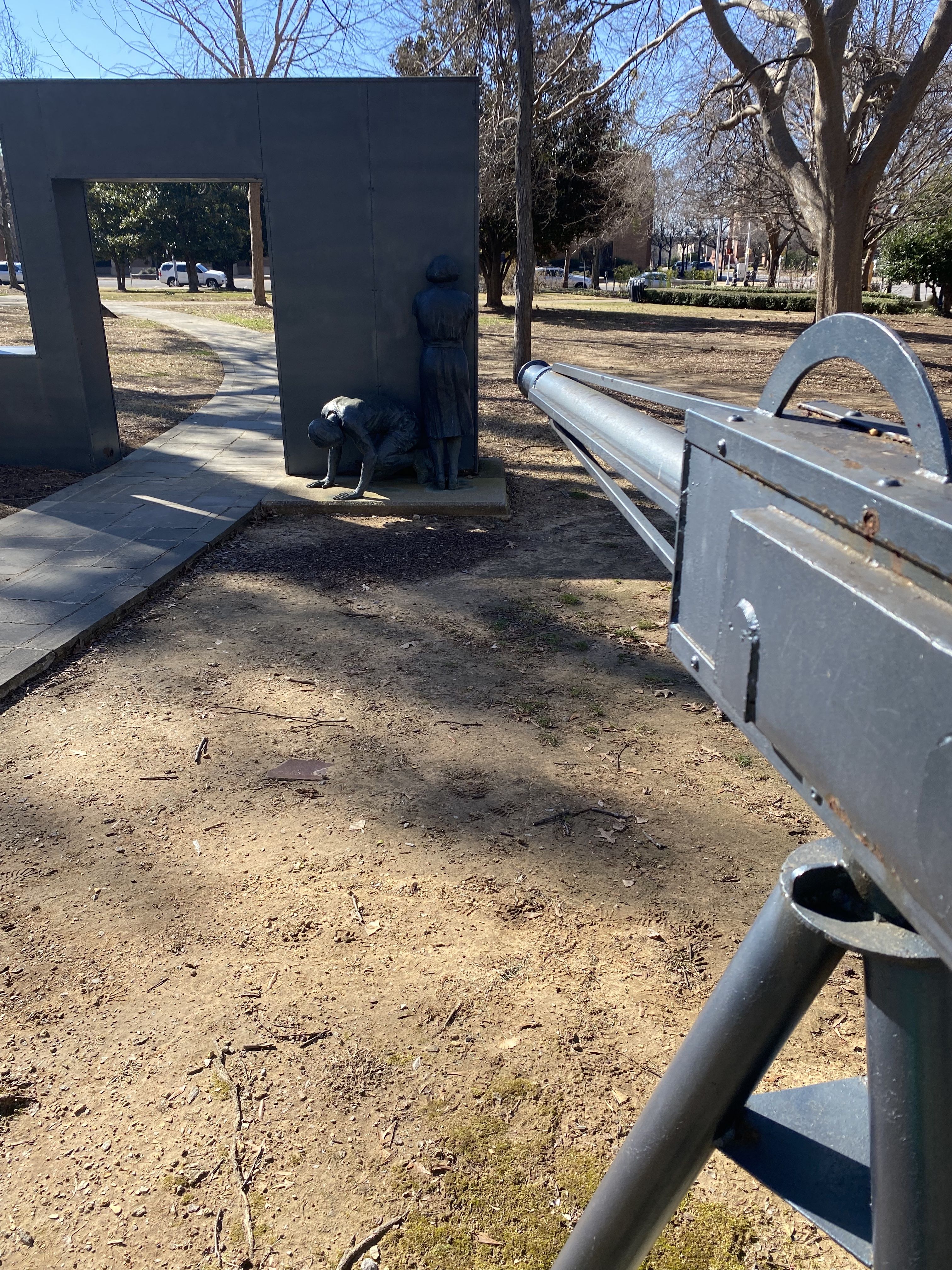
The site of that attack on peaceful child marchers, Kelly Ingram Park just yards from 16th Street Baptist, is now home to monumental works of sculpture commemorating those unvanquished young heroes. Particularly striking, if unsettling, are installations by artitst James Drake portraying the fierce German Shepards being seized on teenagers and children cowering under the withering blasts from the firemen's hoses.
'WOUNDED HEALER': With the Rev Thomas Wilder, Executive Director at Bethel Baptist Martha Bouyer, Carolyn Maull McKinstry outside the congregations new church. 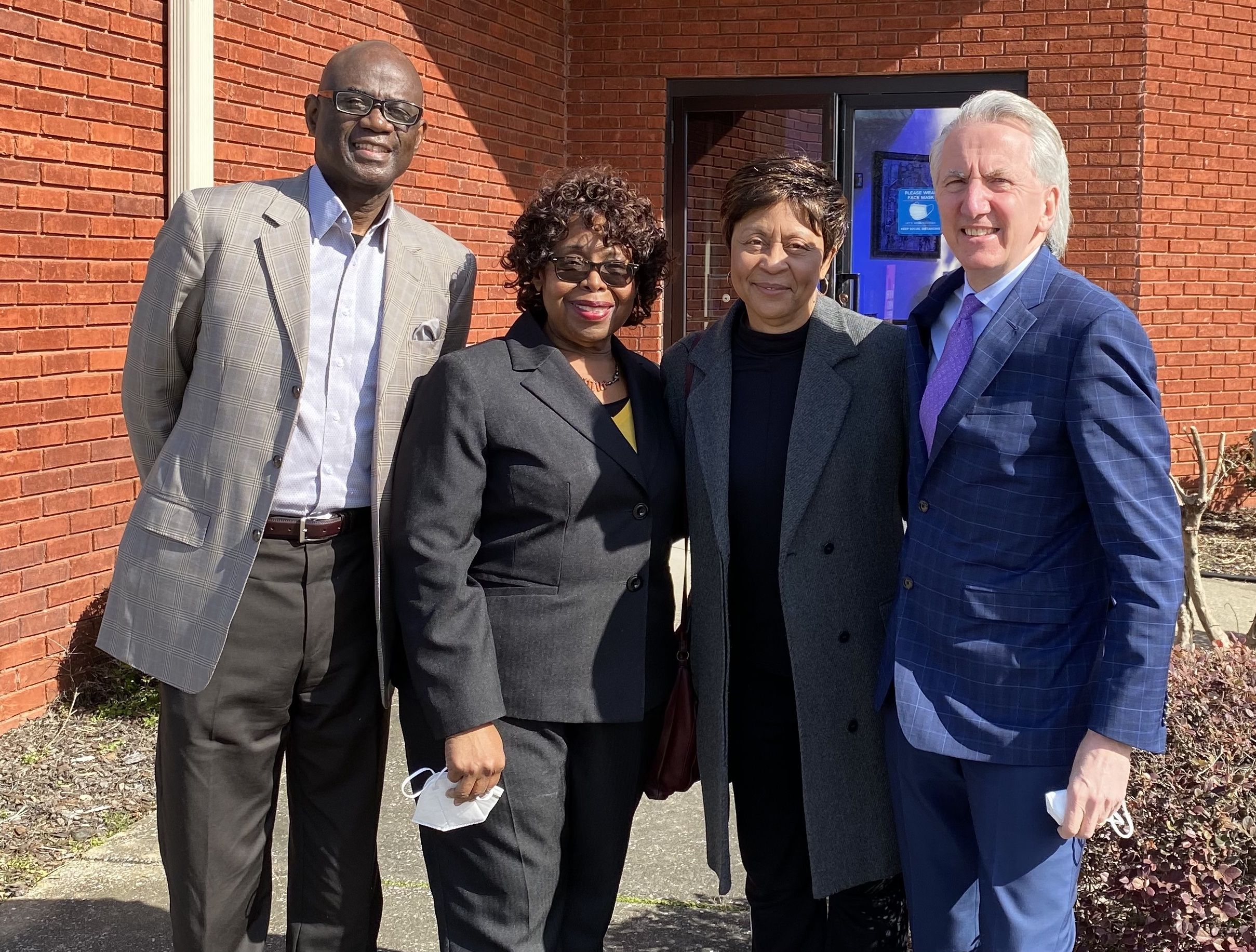
Carolyn comes across as someone who remains deeply pained by the trauma she suffered as a 15-year-old — even though she has now spent the better part of her life drawing on that awful experience to encourage the peacemakers. Our meeting place Bethel Baptist church, is an iconic civil rights site, where Rev Shuttlesworth birthed the Birmingham freedom struggle. In December 1956, when the Supreme Court ruled that segregation was illegal, Rev Shuttlesworth vowed to sit at the front of the bus on Birmingham's segregated transit system. The Klan, working hand-in-glove with the local police force, responded by blowing his home (next door to the church) to kingdom come. Miraculously, the good reverend survived, memorably stating that he had fallen from his bed, through the floor and into the "arms of God".
I asked Carolyn to help me unravel one puzzle which continues to confound: How did 'upstanding Christian people' create and then stand behind a system of segregation so incompatible with the scripture they held dear. Even all these years later, it's a question she grapples with.
"If you're a Christian, how can you not teach that the Bible tells us to treat all men the way you want to be treated?" she wonders. "How can you not know what that is? What is it that makes you think it's all right to maim and kill and hang people? If you're a preacher, you've got the same Bible that we have. And that was my question to a lot of white people when I started this work of reconciliation, 'are we all reading the same Bible?'"
Current minister at Bethel Baptist, the Rev Thomas Wilder believes there can be no resolution of race issues in modern-day America without fair play for the African American community which continues to bear the brunt of insult and attack. For sure, the legacy of second-class citizenship is enduring. Blacks represent 13.2 per cent of the total population in the United States, but 23.8 per cent of the poverty population. Black Americans are incarcerated in State prisons at five times the rate of whites. And, as seen on a distressingly frequent basis on grainy mobile phone videos, from Ferguson to Minneapolis and from Kenosha to Charlottesville, black lives still don't seem to matter very much at all. For too many, 'Make American Great Again' has more than a whiff of 'Make America White Again'.
"I don't think you can reconcile where there's no justice," says Rev Wilder, his tone earnest and considered. "If I stole your wallet and said, 'I'm sorry' and I want to reconcile but I keep your money then I don't think we can be reconciled. I got to give you your wallet back. Then we start from an even keel and we can be reconciled."
Corlette Stewart Burns (below), Director of Birmingham's Sister City programme and daughter of a famed civil rights veteran, understands the impact the struggle for freedom in the Deep South had on communities around the world. Over grits and eggs in Fife's famed breakfast stop she appears surprised, but also relieved, that this white visitor, in The Magic City, ostensibly, to discuss city twinnings, want to jump right into a discussion on Black Lives Matter. I tell her that support for that movement has been led by athletes and a demonstration of solidarity is now part of many sporting events in Britain and Ireland.
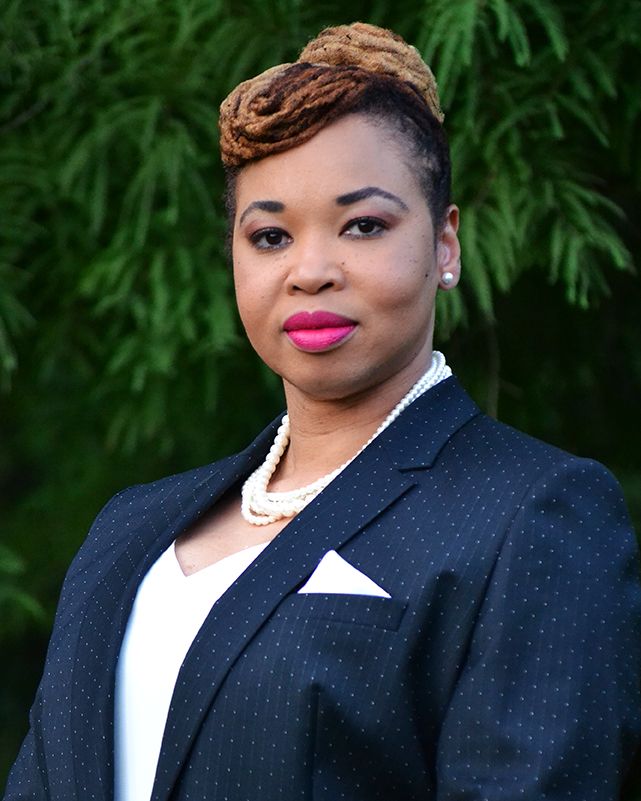
"We do not have to look far in the past to see how the world unites," she says. "On May 25, 2020, we witnessed a police officer commit murder as he kneeled on the neck of George Floyd and saw how such injustice caused an uproar worldwide.
"Some of the same tactics are used today. The tactic of separating families has been an essential component of housing projects where men are not allowed to stay in the homes. The dehumanisation of our people is seen in the US prison system, which is also referred to as slavery by another name. Blacks have long outnumbered whites in US prisons. And despite the discussion around police reform, police violence is a leading cause of death for young men in the United States. Over their life course, about one in every 1,000 black men can expect to be killed by police.
Fifty-five years ago today, four young girls lost their lives when a bomb exploded at Birmingham's 16th Street Baptist Church. Poet Thomas Gardner was blocks away at the time of the explosion. Watch his full poetic tribute to his departed classmates: https://t.co/tea1AtS2It pic.twitter.com/xm4cz3Lymm
— Voices of the Civil Rights Movement (@CivRightsVoices) September 15, 2018
"Have we made progress? Yes, but we are nowhere near where we need to be," adds Corlette, a hint of weariness in her voice. "I have hope that we will one day live in a world where all human beings are treated equally and with respect, despite the gender or color of their skin. However, with over 400 years of systems being developed to support racial hierarchy, I wonder if I am a realist or asking for magic."
Parents in Alabama are calling officials to complain about schools celebrating Black History Month because they worry it teaches "critical race theory," the state's superintendent said.
CRT is a legal framework used to talk about racism and is not taught below university level. pic.twitter.com/Es5TmDFkjh
— AJ+ (@ajplus) February 4, 2022
I returned to The Movement Fellowship Church on the Monday to catch up with Pastor Kris, high school teacher and fellow-pastor Jonathan Hatton, and members of the seniors' ministry Sam Duncan and Pastor Kris' mum Donno. As we tucked into a lunch spread laid on for the visitor, Pastor Kris spoke to the reality of being black in America. "Cornel West says, 'to be black in America is to always live under the threat of violence'. Yet I believe in this hour, the movement cannot die because our ancestors won't allow it. I believe from their graves, they are yet nudging certain ones of us to carry this torch, carry this baton and not think you're going to run the whole race. Most people now pick up the baton and think I'm going to cross the finish line. But there is no finishing line for the movement. It always continues. Each of us share a moment in holding that baton, as it passes down through the movement."
At every turn in Birmingham, symbols of the progress made towards full equality are visible. The very airport is named after the Rev Shuttlesworth and black and whites share workplaces and transport without eyebrows raised. Segregation still exists, of course. The black area once branded 'Dynamite Hill' so frequent were KKK bombings there, remains mired in poverty and home to one community only. (Though there may be a mote in your eye element in my despair at this news: For when I shared with Rev Wilder that we have physical walls separating our communities in Belfast, he took a shocked and audible intake of breath!)
58 years ago a bomb exploded at the 16th Street Baptist Church in B’ham, AL killing these 4 beautiful young ladies. As someone who helped bring their killers to justice, I carry their spirit with me every day. Hate still abounds in the USA & we have to do all we can to stop it pic.twitter.com/iLrbOBkjx5
— Doug Jones (@DougJones) September 15, 2021
For history teacher Jonathan Hatton, the four years of the Trump Presidency moved the African American community "back 40-50 years". "In the words of King we have celebrated symbols of progress as substance," he said. "We stopped applying pressure when we had symbols. Trump's election did two things. It woke many of the people who had thought we came a long way because we elected a black president. And then it woke another group of people who had been asleep for 40 years. With those people being awakened, you have this sense of entitlement reappearing. You have the sense of suppression with some of the same tactics that they were using during the civil rights movement reappearing."
Before I left, Pastor Kris' mum insist I chat by phone to a pal of hers, "an elder" who had taken part in the Children's Crusade of May 1963 and had been imprisoned in the fairground after the jails filled up. Sister Jesse Shepherd sounded as feisty and indomitable today as she must have been back in those early days of the civil rights struggle. She is at turns saddened at the enduring discrimination she witnesses all around her but hopeful also that the Christian instruction to love your neighbour will prevail. "They don't have the dogs now," she says. "But they are still killing us, still arresting us without purpose because our colour is black. I wish we could just learn to live as one nation and stop hating each other."
That conviction, even in the increasingly secular times, that churches are "the beating heart" of the African American community was echoed in the eloquent and emotional eulogy of President Obama for those slaughtered in that Charleston sanctuary by Dylann Roof. "A sacred place, this church," he said. "Not just for blacks, not just for Christians, but for every American who cares about the steady expansion of human rights and human dignity in this country; a foundation stone for liberty and justice for all."
In Birmingham, Alabama, until Charleston location of the deadliest racist attack on a black church, the African American community continues to show infinite patience and amazing grace as it waits for more hands — white hands in particular, Irish American perchance — to join in the work of building on that foundation stone.

